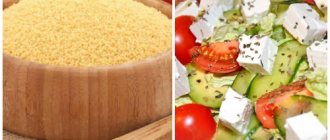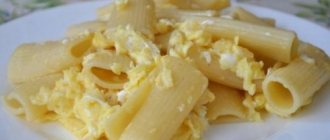5 servings
20 minutes
87 kcal
No rating
- Ingredients
There is probably not a single restaurant or cafe that does not have Greek salad on its menu. This wonderful dish, originally from sunny Greece, is loved by everyone - a refreshing combination of fresh vegetables, herbs, salty feta cheese, olives and unusual oregano seasoning perfectly harmonizes in a healthy and tasty dish.
Traditionally, Greek is prepared with feta cheese, but in our area you can often find its replacement with feta cheese. Its taste is milder, and it is more common on our tables, but this does not detract from the charm of the salad. This is exactly the recipe I will share with you today.
Authentic salad with fetax
Greece is very proud of its delicious sheep's milk feta. So, like the real star of the show, she tops the Greek salad. Recipes with photos are prepared with fetaxa, cut into triangular or square shapes. Usually the portion is large so that everyone can enjoy the taste. And it almost never crumbles into crumbs. The authenticity of a dish lies in simple details.
Ingredients:
- 4 (about 150 g each) tomatoes;
- 2 gherkins;
- 1 large green bell pepper;
- 1 small red onion;
- 1 stack Kalamata brand olives;
- 2 tbsp. l. red wine vinegar;
- 3-4 tbsp. l. olive oil;
- 1 tsp. dried oregano;
- Salt;
- 140 gr. Fetax cheese.
Authentic salad with fetax
Cooking steps:
- You can study and slightly change the sequence of steps to prepare your own Greek salad. The classic recipe with fetax photo is prepared in just a few minutes. Rinse and pat dry the vegetables.
- Slice the tomatoes, remove the junction with the stem.
- Cut the cucumbers in half lengthwise, then slice into halves of rings.
- Cut the pepper in half, remove the seeds and membranes. Cut into half rings or quarter rings (depending on the size of the vegetable).
- Peel the onion and chop into thin half rings. Cutting into rings looks much more impressive. To do this conveniently, do not cut off the tail of the onion during the peeling process.
- Mix vegetables for Greek salad in a deep bowl. Prepare the classic recipe with fetaxa with Kalamata olives. There is a lot of controversy regarding the choice of olives. Some people add the bone, while others consider its presence in the dish unacceptable. So the choice is yours, add what you think is appropriate.
- Transfer the salad to a salad bowl to serve.
- Drizzle olive oil and red wine vinegar evenly, sprinkle with oregano and a pinch of salt.
- Place feta cheese in a square or triangle shape on top of the dish.
- Finish cooking by drizzling the dish with a little extra olive oil. Add another pinch of oregano on top and serve.
Salad with honey dressing
The sky's the limit when it comes to Greek salad. It’s difficult to make a classic recipe with fetax even tastier than it can be by adding fresh, sunny vegetables. But there are some accents that help add some flair. Read about this version of the dish below.
Ingredients:
- 1 small red onion;
- 1 medium lemon;
- ¼ cup red wine vinegar;
- 1 tsp. dried oregano;
- 1 tsp. honey;
- Ground pepper;
- ¼ cup olive oil;
- 12-14 cherry tomatoes;
- 1 green pepper;
- 1 stack pitted Kalamata olives;
- 115 gr. fetakas;
- 3 gherkins;
- Fresh oregano leaves.
Salad with honey dressing
Cooking steps:
- Peel and chop the onion into half rings.
- Soak the chopped onion in a bowl of heavily salted ice water for 15 minutes.
- For a Greek salad recipe with fetaxa, prepare a dressing. Whisk vinegar, lemon zest and juice, honey, dried oregano, 1/2 teaspoon salt and 1/4 teaspoon pepper in a large bowl.
- Add olive oil in a thin stream down the side of the glass and whisk until emulsified.
- Cut the tomatoes in half or into quarters. Place tomatoes in a bowl.
- If you are unsure about the taste of cucumbers, peel the peel, leaving alternating strips. Trim the ends, halve lengthwise and cut crosswise, about 0.5mm. thick. Add to bowl with tomatoes on top of Greek salad. With fetax recipes with photos, cook in a bowl for easy mixing, then place the dish on portioned plates.
- Peel the pepper and cut into strips. Add to bowl.
- Cut the olives in half and place in a bowl.
- Drain the onions, lightly squeeze out excess moisture with your hands, add the onions to the bowl and stir.
- Drain the brine from the cheese, cut it horizontally into 4 rectangles.
- Divide the salad between plates.
- Top with feta and dried spices.
- Drizzle with olive oil and season with pepper.
Classic version
Satisfy your taste buds with the refreshing flavors of the Mediterranean with this Greek Fetaxa Salad. Recipes with photos become vivid examples of how Greek cuisine creates real culinary masterpieces from simple ingredients. To make a traditional version of the dish, take care of the ingredients. Find juicy, ripe tomatoes, perfectly fresh cucumbers, premium olive oil. And most importantly, don’t forget fetaksa - a salty, but much more tender variety of feta cheese.
Ingredients:
- 1 green pepper;
- 1 medium red onion;
- 2 cucumbers;
- 3 tomatoes;
- 10-15 black Kalamata olives;
- 0.2 kg. fetax cheese;
- 1 tbsp. l. red wine vinegar;
- 1 tsp. dried oregano;
- ¼ cup olive oil;
- Salt, freshly ground black and white pepper.
Classic version
Cooking steps:
- Wash thoroughly and blot moisture from vegetables onto Greek salad. Classic recipe with fetax photo, prepare before serving.
- Peel the onion.
- Cut the tomatoes into slices, cut the onion into thin rings.
- Fresh cucumber does not need to be peeled. Cut the vegetables into thick slices and place everything in a large bowl. Don't forget to add olives too.
- Season with salt and pour in olive oil and vinegar.
- Mix everything together until the flavors meld.
- Add salt, but remember in moderation, because feta cheese and olives are quite salty.
- Greek salad (Horiatic) according to the classic recipe with fetax is always served. It is usually placed on top of vegetables. Place the cheese, drizzle with a little more olive oil, and sprinkle with a pinch of oregano. Serve as a side dish or a light summer meal with plenty of crusty bread.
Greek salad: classic recipe with feta cheese
The classic of the genre in the preparation of such a salad is soft feta cheese, but in many famous restaurants, and even at home, they use feta cheese more. The difference is that feta, with its delicate structure and spruce noticeable sourness, ideally emphasizes the freshness of the vegetables used in the salad. Cheese cheese adds new interesting flavor notes to an already familiar dish that will definitely delight gourmets.
You can also experiment with tomatoes. Many classic recipes prescribe cherry tomatoes, but an alternative can be small tomato fruits with dense pulp.
So, for a classic Greek salad with cheese you will need the following products:
- lettuce ─ 50 grams;
- tomatoes ─ 150 grams;
- cucumbers ─ 150 grams;
- feta cheese – 150 grams;
- salad pepper (preferably multi-colored) ─ 150 grams;
- sweet onion (or shallot) ─ 75 grams;
- green olives (pitted) ─ 100 grams.
Refueling:
- 75 ml cold pressed olive oil;
- 50 ml balsamic vinegar;
- Everyone adds salt and pepper in the right amount.
Preparation will take about twenty minutes; from such a set of products, the salad can feed three or four people.
Calorie content (per 100 g of finished dish) is approximately 120 Kcal.
- First you need to thoroughly wash and dry the vegetables and lettuce you use.
- The cutting of the ingredients in this dish is special ─ large cubes. We simply tear the salad leaves with our hands directly into the bowl, where the dish will be dressed.
- Cut the cheese and add to the salad. Drain the liquid from the olives and also place in a bowl.
- We cut cherry tomatoes into quarters, but if other tomatoes are used, then each half should be divided into six or eight parts (it all depends on the size of the tomato itself). We also chop the cucumbers coarsely and place them in a common pot.
- We first remove the seeds and stems from multi-colored sweet peppers, cut them into wide strips, and then turn them into cubes. Cut the onion into thin half rings.
- To make the dressing, combine olive oil with balsamic vinegar and desired spices. Mix the resulting mixture thoroughly, you can even beat it slightly.
- Greek salad with feta cheese should be dressed just before serving.
Greek salad with avocado
You can never have too many good salad recipes. In order not to miss a wonderful variety of a popular dish, read the publication to the end. Repeating the preparation, you will be surprised how easy it is to prepare a Greek salad recipe with fetaxa from simple ingredients - a worthy side dish for a delicious beef steak or grilled fish.
For the salad:
- 4 medium Roma tomatoes;
- 1 medium English cucumber;
- 1/2 small red onion;
- 1 small green or yellow bell pepper;
- 3/4 cup kalamata or other olives;
- 200 gr. fetaxes;
- 1 medium avocado (not too soft).
Dressing ingredients:
- 6 tbsp. l. olive oil;
- 1 large clove of garlic;
- 3-5 sprigs of fresh parsley;
- 1 tbsp. l. red wine vinegar;
- 1.5 tbsp. l. fresh lemon juice;
- 1 tsp. dried oregano;
- 3/4 tsp. honey;
- Salt to taste.
Greek salad with avocado
Cooking steps:
- Prepare vegetables for Greek salad. The classic recipe with fetax will turn out delicious from ripe vegetables. Wash, wipe away moisture.
- Cut the tomatoes into slices, cucumbers into half rings.
- Core the pepper and chop into half rings.
- Try to thinly slice the onion into rings.
- Cut the olives in half. If you don’t have Calamata (juicy, meaty), use any others.
- Prepare the dressing: whisk all ingredients, season with salt and freshly ground pepper.
- Add the avocado last. Once peeled, it quickly turns black.
- Mix vegetables with dressing and place in salad bowl.
- Place fetakasa pieces on top.
Calorie content of Greek cheese. Chemical composition and nutritional value.
Nutritional value and chemical composition of Greek cheese.
The table shows the nutritional content (calories, proteins, fats, carbohydrates, vitamins and minerals) per 100 grams of edible portion.
| Nutrient | Quantity | Norm** | % of the norm in 100 g | % of the norm in 100 kcal | 100% normal |
| Calorie content | 287 kcal | 1684 kcal | 17% | 5.9% | 587 g |
| Squirrels | 9.8 g | 76 g | 12.9% | 4.5% | 776 g |
| Fats | 26 g | 56 g | 46.4% | 16.2% | 215 g |
| Carbohydrates | 3.4 g | 219 g | 1.6% | 0.6% | 6441 g |
| Water | 55.22 g | 2273 g | 2.4% | 0.8% | 4116 g |
| Ash | 5.2 g | ~ | |||
| Vitamins | |||||
| Vitamin A, RE | 125 mcg | 900 mcg | 13.9% | 4.8% | 720 g |
| Retinol | 0.125 mg | ~ | |||
| beta carotene | 0.003 mg | 5 mg | 0.1% | 166667 g | |
| Vitamin B1, thiamine | 0.154 mg | 1.5 mg | 10.3% | 3.6% | 974 g |
| Vitamin B2, riboflavin | 0.844 mg | 1.8 mg | 46.9% | 16.3% | 213 g |
| Vitamin B4, choline | 15.4 mg | 500 mg | 3.1% | 1.1% | 3247 g |
| Vitamin B5, pantothenic | 0.967 mg | 5 mg | 19.3% | 6.7% | 517 g |
| Vitamin B6, pyridoxine | 0.424 mg | 2 mg | 21.2% | 7.4% | 472 g |
| Vitamin B9, folates | 32 mcg | 400 mcg | 8% | 2.8% | 1250 g |
| Vitamin B12, cobalamin | 1.69 mcg | 3 mcg | 56.3% | 19.6% | 178 g |
| Vitamin D, calciferol | 0.4 mcg | 10 mcg | 4% | 1.4% | 2500 g |
| Vitamin D3, cholecalciferol | 0.4 mcg | ~ | |||
| Vitamin E, alpha tocopherol, TE | 0.18 mg | 15 mg | 1.2% | 0.4% | 8333 g |
| Vitamin K, phylloquinone | 1.8 mcg | 120 mcg | 1.5% | 0.5% | 6667 g |
| Vitamin RR, NE | 0.991 mg | 20 mg | 5% | 1.7% | 2018 |
| Macronutrients | |||||
| Potassium, K | 62 mg | 2500 mg | 2.5% | 0.9% | 4032 g |
| Calcium, Ca | 493 mg | 1000 mg | 49.3% | 17.2% | 203 g |
| Magnesium, Mg | 19 mg | 400 mg | 4.8% | 1.7% | 2105 g |
| Sodium, Na | 1116 mg | 1300 mg | 85.8% | 29.9% | 116 g |
| Phosphorus, P | 337 mg | 800 mg | 42.1% | 14.7% | 237 g |
| Microelements | |||||
| Iron, Fe | 0.65 mg | 18 mg | 3.6% | 1.3% | 2769 g |
| Manganese, Mn | 0.028 mg | 2 mg | 1.4% | 0.5% | 7143 g |
| Copper, Cu | 32 mcg | 1000 mcg | 3.2% | 1.1% | 3125 g |
| Selenium, Se | 15 mcg | 55 mcg | 27.3% | 9.5% | 367 g |
| Zinc, Zn | 2.88 mg | 12 mg | 24% | 8.4% | 417 g |
| Digestible carbohydrates | |||||
| Mono- and disaccharides (sugars) | 4.09 g | max 100 g | |||
| Essential amino acids | |||||
| Arginine* | 0.47 g | ~ | |||
| Valin | 1.065 g | ~ | |||
| Histidine* | 0.397 g | ~ | |||
| Isoleucine | 0.803 g | ~ | |||
| Leucine | 1.395 g | ~ | |||
| Lysine | 1.219 g | ~ | |||
| Methionine | 0.368 g | ~ | |||
| Threonine | 0.637 g | ~ | |||
| Tryptophan | 0.2 g | ~ | |||
| Phenylalanine | 0.675 g | ~ | |||
| Nonessential amino acids | |||||
| Alanin | 0.639 g | ~ | |||
| Aspartic acid | 0.779 g | ~ | |||
| Glycine | 0.097 g | ~ | |||
| Glutamic acid | 2.421 g | ~ | |||
| Proline | 1.378 g | ~ | |||
| Serin | 1.169 g | ~ | |||
| Tyrosine | 0.668 g | ~ | |||
| Cysteine | 0.083 g | ~ | |||
| Sterols (sterols) | |||||
| Cholesterol | 89 mg | max 300 mg | |||
| Saturated fatty acids | |||||
| Saturated fatty acids | 14.946 g | max 18.7 g | |||
| 4:0 Oil | 0.775 g | ~ | |||
| 6:0 Kapronovaya | 0.573 g | ~ | |||
| 8:0 Caprylic | 0.546 g | ~ | |||
| 10:0 Kaprinovaya | 1.977 g | ~ | |||
| 12:0 Lauric | 1.159 g | ~ | |||
| 14:0 Miristinovaya | 2.761 g | ~ | |||
| 16:0 Palmitinaya | 5.151 g | ~ | |||
| 18:0 Stearic | 1.488 g | ~ | |||
| Monounsaturated fatty acids | 4.623 g | min 16.8 g | 27.5% | 9.6% | |
| 16:1 Palmitoleic | 0.385 g | ~ | |||
| 18:1 Oleic (omega-9) | 3.975 g | ~ | |||
| Polyunsaturated fatty acids | 0.591 g | from 11.2 to 20.6 g | 5.3% | 1.8% | |
| 18:2 Linolevaya | 0.326 g | ~ | |||
| 18:3 Linolenic | 0.265 g | ~ | |||
| Omega-3 fatty acids | 0.265 g | from 0.9 to 3.7 g | 29.4% | 10.2% | |
| Omega-6 fatty acids | 0.326 g | from 4.7 to 16.8 g | 6.9% | 2.4% |
The energy value of Greek cheese is 287 kcal.
Primary Source: Created in the application by the user. Read more.
** This table shows the average levels of vitamins and minerals for an adult. If you want to know the norms taking into account your gender, age and other factors, then use the “My Healthy Diet” application.











